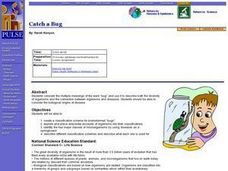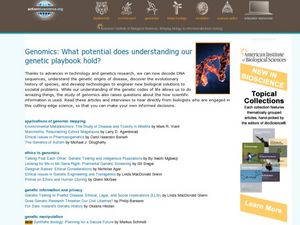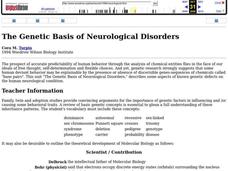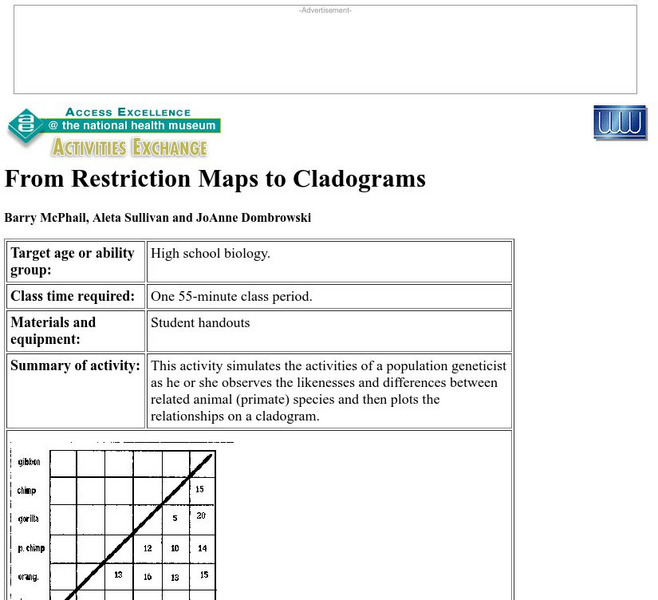Curated OER
The Electrophoresis of Human Hemoglobin
Students analyze different types of hemoglobin. They use the technique of agarose gel electrophoresis to separate human hemoglobin molecules according to their electrical charge, size, and/or shape. Students relate the migration of...
Curated OER
The Chromosome Connection
Students evaluate the degree of chromosome similarity and difference between humans and apes. Students infer about the relationship between a human and ape based on similarities found.
Curated OER
Arsenic and Human Health
Ninth graders concentrate on arsenic poisoning as an example of the connections among health, geography, and geology as they develop a persuasive presentation about the dangers of arsenic in the drinking water, targeting a specific...
Curated OER
Issues in Genomics
Students explore the definition of ethics and genomics. In this organism lesson students participate in the chosen teacher lesson.
Curated OER
Punnett Squares/Genetics
Ninth graders complete a monohybrid cross and a dihybrid cross. In this biology lesson, 9th graders predict the traits of offspring using the Punnett square. They differentiate recessive and dominant genes.
Curated OER
Construction of a Hemoglobin Gene
Students see how eight pairs of triplets are equivalent to part of a gene and control a part of heredity. They comprehend how blood corpuscles manufacture normal hemoglobin. Students already comprehend that genes control the synthesis...
Curated OER
Secret Codes
Students examine Morse code and how it is used. In this secret codes lesson students decode messages, make their own codes and have other students crack the code.
Curated OER
Chromosomes and Genetic Mapping
Students create models of chromosomes using clay, coins, beads, or marbles. They complete a worksheet regarding their crossover frequencies they created with their chromosomes and gene models. They read an essay on sex chromosomes and...
Curated OER
What Can We Learn From the X Chromosome?
Learners read about the X and Y chromosomes in humans and complete a worksheet.
Curated OER
The Genetic Basis of Neurological Disorders
Young scholars explore neurological disorders. They examine the presence and absence of discernible genes. Students describe neruological diseases and draw faces of affected persons. They play a human neurology disorders learning game.
Curated OER
Heredity (Mendelian Genetics)
Students observe and record observations of whether a person is a taster or nontaster. They test selected individuals from their families and peer groups and chart all findings to determine which trait (e.g. taster or non-taster) is...
Curated OER
X or Y- Does it Make a Difference?
Students examine the X and Y chromosomes. In this research lesson plan, students use the 5E lesson plan model as they read articles about human chromosomes then discuss their findings and opinions.
Curated OER
The Day an Egg Solved the Mystery of the Cell
Learners conduct an experiment comparing human cells to chicken cells. In this cells lesson plan, students conduct an experiment to see how nutrition moves through cells and how to better take care of their bodies.
Curated OER
CONSTRUCTION OF A HEMOGLOBIN GENE
Learners use research to see how eight pairs of triplets are equivalent to part of a gene and control a part of heredity. They also understand how red blood corpuscles manufacture normal hemoglobin.
Curated OER
Ladders of Life
Students explore the field of genetics. They examine four basic traits. Students demonstrate their knowledge of phenotype and genotype by charting their personal traits. Students compelte a Meiosis chart. From the chart results,...
Curated OER
The Genetic Basis of Neurological Disorders
Students describe some aspects of known genetic defects on the human neurological condition. They participate in a variety of exercises including drawings, games, and analogies.
National Health Museum
Access Excellence: Making a Phylogenetic Tree Lesson Plan
Constructing phylogenetic trees may be a daunting task for learners, but this lesson plan is a simulation of what molecular biologists must do to determine relationships. This plan is for students who have a good grasp of DNA structure...
University of Maryland
Univ. Of Maryland: Master of Chemical and Life Sciences: Dna Bracelets [Pdf]
Using a bead-bracelet simulation, construct a sequence of amino acids. Then, discover the effects of silent, point, and frameshift mutations.
National Health Museum
Nhm: Amino Acid Sequences Show Evolution
This lesson plan focuses on differences in the amino acid sequence of hemoglobin and myoglobin proteins. They use the number of differences to create a phylogenetic tree.
National Health Museum
Nhm: Restriction Maps to Cladograms Lesson
This lesson plan requires students to analyze DNA restriction maps to determine the differences in the sequence for several primates and humans. They then use the information to create a cladogram.
National Health Museum
Access Excellence: Molecular Biology/primate Phylogeny
This lesson plan involves comparison of amino acids to create a phylogenetic tree of primates. Students will also use other species information to draw conclusions about evolutionary relationships.

















